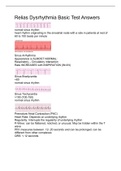Other
Relias Dysrhythmia Basic Test Answers Solution guide 2023.
- Course
- Institution
- Book
Relias Dysrhythmia Basic Test Answers normal sinus rhythm heart rhythm originating in the sinoatrial node with a rate in patients at rest of 60 to 100 beats per minute Sinus Arrhythmia Appearance is ALMOST NORMAL: Respiratory – Circulatory interaction Rate INCREASES with INSPIRATION (...
[Show more]



